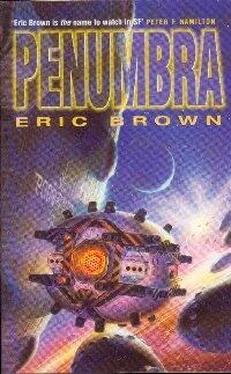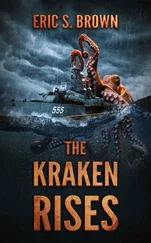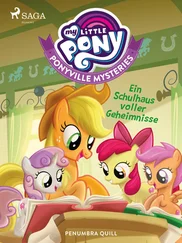Bennett’s last shift began with the late arrival of his copilot and ended with a near-fatal collision between his Viper tug and a colony liner. In between, he learned a little about Bhao Khet Buddhism.
He crawled through the umbilical and strapped himself into the pilot’s couch. The cabin was a cramped, darkened wedge that stank with the sweat of a thousand previous pilots. The narrow, mock-leather couches were so low-slung that he operated almost horizontally, staring down the length of his body through the acutely angled view-screen.
After ten days aboard Redwood Station, piloting his tug two shifts a day, Bennett was looking forward to his leave period on Earth. Lately he had come to hate his job. What years ago had seemed to him a life of excitement and glamour had turned into nothing more than mind-numbing routine.
He jacked the leads into his helmet and got through to Control. “Bennett here. Any sign of my co-pilot?” They should have been sealing up and splitting five minutes ago.
“Ah… check, Bennett. She’s on her way.”
He settled back and magnified the viewscreen. There were times, even after fifteen years, when he was struck anew by the visual majesty of so many colossal orbital structures. His tug adhered to the skin of the station like some minuscule parasite to the flank of a basking cetacean. Beyond the station, strung out in a vast parabolic archipelago, industrial orbitals and habitats, labs and factories scintillated in the raw light of the sun. Tiny vessels, reduced to the size of gnats by comparison, shuttled between the orbitals. Occasionally, bigger tugs set off at right angles from the shimmering necklace, heading for the mining depots out on the asteroid belt.
As Bennett watched, a colony ship detached itself from an orbital transit terminal, turned with the colossal languor of all vessels its size, and moved to a phase point well away from the orbitals.
The sight of these interstellar colony ships embarking for the stars never failed to stir in Bennett a sense of venture quashed, of opportunities missed. For how many years had he promised himself that, one day, he would leave Earth and relocate to one of the colony worlds? He had dozens of downloads and holo-cubes back at his dome advertising holidays and resettlement on a hundred exotic planets.
He wondered whether it was the coward in him that shied away from the challenge of new experiences, contenting himself with the mind-numbing routine of work in the high orbitals.
The systems analyst appeared in the hatch and swam through. “Sorry I’m late,” she said as she floated past, elbowing him in the chest. He noticed that she was barefoot, an increasing trend aboard the station.
She was a tiny woman in a bright scarlet flight-suit, black-skinned and shaven-skulled. There was something severely Oriental about her features, the slanting eyes set flush in the sheer fall of her cheeks, at once childlike yet knowing.
He tried to guess at her age. She might have been anything from fifteen to thirty.
She pulled on her helmet. The bulbous headgear on so slight a figure appeared ridiculously top-heavy and antlike. She was having difficulty with the chin strap, frowning as she tried to snap the catch.
Bennett thought of Ella, his dead sister, and the face she had made when trying to buckle her cycling helmet, and he had to stop himself from reaching out to give assistance.
She strapped herself in and analysed the computer systems, going through the checks with a swift professionalism, small hands darting around the console housing, lips moving as she talked to herself.
The name-tag stitched on to her upper arm said: TEN LEE THENEKA.
“Josh Bennett,” he said. “Where you from, Ten?”
She closed her eyes briefly with a mixture of impatience and disdain. “Bhao Khet, Rigel VII. Was Rocastle’s World five years ago, before the War of Independence.”
“I know it.” From the brochures. “Vietnamese?”
“Principally Viet-Zambian.”
He nodded. That explained her jet skin.
“Now, Joshua, if the geography lesson’s over for the day, do you think you might get this ship up and running? It’s over to the ICI Industrial for routine ferry work, then up to phase point with supplies for the liners. She’s all yours.”
Bennett gave the command to disengage and through the sidescreen the excoriated skin of the station seemed to drift away. At the required distance from the dock, the engines cut in and they banked and followed the long curving line of the orbitals.
“Been on the station long?” Bennett asked.
Ten Lee sighed, staring at him. “As a matter of fact, one week.”
“Settling in okay?”
She flashed him a glance. “Why all the questions?”
“Hey—I’m sorry.” He looked at her, surprised at the tone of her voice.
He hesitated. Outside, hulking orbitals flashed by.
“It’s just that you’re new here. I was curious, that’s all. We don’t get many colonial spacers through this way. They’re all from the academy on Mars.”
He realised he was shooting off, trying to win her over.
“I don’t like much personal contact, okay?” she said. “Where I come from, we realise the danger of emotion. We try to distance ourselves from the illusions of sentiment, to avoid the suffering that is a consequence of living too much in this world. It is all maya—things that are impermanent and therefore illusory.”
Bennett nodded. She sounded like one of the many religious fanatics he came across these days. “Isn’t that some kind of Buddhism?”
She regarded him, nodded minimally. “The Bhao Khet code of the philosophy. We’ve taken it further even than the Avatamsaka school. One of the tenets of my belief is the attainment of sunyata, of nothingness. I do not need the petty distractions of your society.”
He shrugged. “Sorry if I offended you.”
Ten Lee smiled and flipped down the visor screen of her helmet.
They came to the sunlit vastness of the ICI Industrial and approached a cantilevered shelf marked with the stark black numeral 65. Bennett took control of the tug, turned it about and backed on to the shelf stacked with containers.
Ten Lee ran a hand across a touch-pad, instructing the tug’s grabs to engage with the containers. Contact and engagement rang through the tug as if it were a struck bell. Bennett lowered the visor on his helmet and monitored the pick-up on the integral screen, less out of necessity than for something to watch during the hour it took to load up.
He had often wondered why this class of tug had been named Viper; Squid would have been more appropriate. With its tapering nose-cone and multiple trailing grabs, it resembled nothing so much as that many-tentacled creature of the deep.
“Ease forward, Joshua,” Ten Lee said.
Bennett touched the tug forward ten metres and the vessel shook as more grabs snaked from its stern and contacted with the containers. This procedure was repeated for the next fifty minutes until Ten Lee gave the thumbs up. On his helmet screen, the nose-cone of the tug was dwarfed by the bulk of the two dozen containers looming aft.
Bennett eased the tug from the shelf and set course for a slow traverse of the inner curve of the serried orbitals. With the computer running things, he flipped up his visor, lay back and watched Ten Lee.
She lifted her visor, frowned down at the monitor and shook her encephalic, helmeted head.
“Something wrong?” he asked.
“I… don’t know. Yes, but not so serious, I think. We’re scheduled to pick up a load from the Burgess manufactory bound for the phase point, but the pre-programmed route takes us past the interstellar terminal.”
Читать дальше












